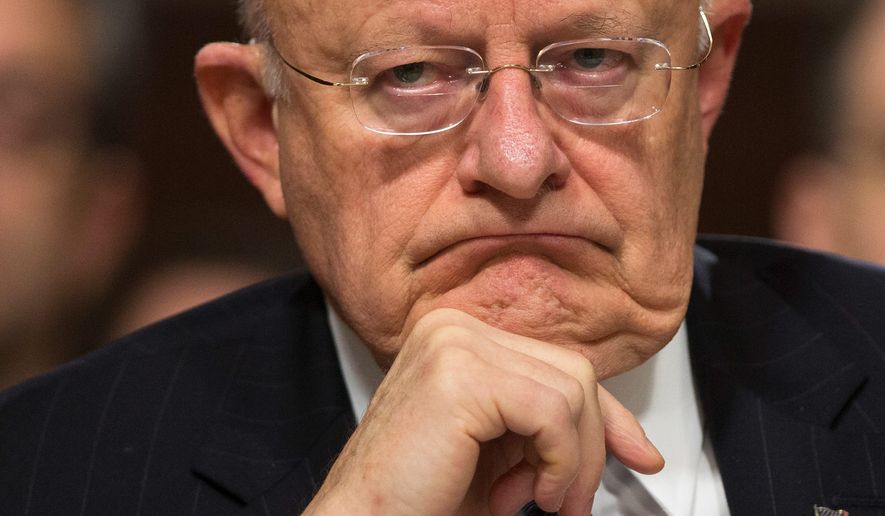As recently as Nov. 17, James Clapper, the nation’s top intelligence officer, told Congress his agencies “don’t have good insight” into a direct link between WikiLeaks and the emails supposedly hacked by a Russian operation from Democrats and the Hillary Clinton campaign.
During the campaign, Wikileaks released reams of embarrassing internal emails between campaign chairman John Podesta, other campaign officials and the Democratic National Committee. One emailed showed candidate Clinton was provided the questions ahead of a CNN town hall appearance.
Democrats are now on a campaign implying that the hacking won the election for Donald Trump and have pressed the Obama administration for a far reaching investigation.
The Washington Post reported Friday that the CIA has secretly concluded that the Vladimir Putin regime directed hackers to penetrate the Democrats’ emails expressly to help Republican Trump win the election. The Post said the CIA has identified people with connections to the Russia government who supplied the stolen emails to Wikileaks.
That is not what Mr. Clapper, the director of national intelligence, told the House Intelligence Committee at an open hearing on Nov. 17.
Asked about Russia and Wikileaks, Mr. Clapper said, “As far as the WikiLeaks connection, the evidence there is not as strong and we don’t have good insight into the sequencing of the releases or when the data may have been provided. We don’t have as good insight into that.”
Julian Assange, who founded the anti-secrecy Wikileaks, has denied receiving the emails from people connected to the Putin government. Mr. Assange is himself a hacking expert and directs a cadre of such computer thieves around the world.
Republicans are generally skeptical about the intelligence to date. But it seems clear there will be congressional investigations next year into the extent to which the anti-West Mr. Putin is attempting to influence American elections and policymaking.
Mr. Putin, an elected, but autocratic ruler, is conducting information warfare against European states, using hacking and propaganda to instill a lack of citizen confidence in the western democracies while at home preaching the rise of Russia.
During the election, Mr. Clapper issued a statement on Oct. 7 saying the intelligence community is confident “that the Russian government directed the recent compromises of emails from U.S. persons and institutions, including from U.S. political organizations.”
He said the disclosures by Wikileaks and two other sites “are consistent with the methods and motivations of Russian-directed efforts.”
But more than a month later on Nov. 17, he told the House committee his agencies “don’t have good insight” on whether Russia-directed people provided the actual emails to Wikileaks.
It is possible new information has arisen. The DNI headquarters had no immediate comment on Saturday.
Mr. Putin’s motivation for trying to interfere in the U.S. election might be the praise he has heard from Mr. Trump, who called him a “strong” leader.”
“I don’t believe they interfered. That became a laughing point, not a talking point, a laughing point. Any time I do something, they say, ’Oh, Russia interfered,’” Mr. Trump told Time magazine in an interview published Wednesday. “It could be Russia. And it could be China. And it could be some guy in his home in New Jersey.”
President Obama has ordered intelligence agencies to do a review of Russian hacking during the election and report back before he leaves office Jan. 20.
Some Republicans believe the Democrats drumbeat on a Russian connection is part of an overall campaign to delegitimize Mr. Trump’s upcoming presidency.
“Russia had nothing to do with the fact that Hillary Clinton didn’t resonate with the right voters the same way Donald trump did,” said Rep. Duncan Hunter, California Republican and an early congressional backer of the winner. “The idea that Trump’s victory, and thereby voter judgment, was guided by Russia is a slap in the face of the American electorate. Trump won because he had a winning message and he’s got the backbone to see it through.”
House Intelligence committee Chairman Devin Nunes, California Republican and a member of Trump’s transition team, said on Friday:
“Russia’s cyber-attacks are no surprise to the House Intelligence Committee, which has been closely monitoring Russia’s belligerence for years—as I’ve said many times, the Intelligence Community has repeatedly failed to anticipate Putin’s hostile actions. Unfortunately the Obama administration, dedicated to delusions of ’resetting’ relations with Russia, ignored pleas by numerous Intelligence Committee members to take more forceful action against the Kremlin’s aggression. It appears, however, that after eight years the administration has suddenly awoken to the threat.”
CIA Director John Brennan advised Mr. Obama’s 2008 president campaign and worked in the White House before going to CIA.
Weeks before the 2012 election, the CIA concluded there was a protest outside the burned U.S. mission in Benghazi, Libya, as an explanation for the deadly attack. That message was delivered to the American people, when in fact no protest had occurred. Internal White House emails showed aides wanted talking points to say the attack was not related to any Obama policies.
The Washington Post ran a story Nov. 24 quoting a secretive research group, with no identities of its experts, as saying the Russians had infiltrated a number of news sites with “fake news” stories that tilted the election to Mr. Trump.
Other liberal media outlets have slammed the story as weakly sourced and unfair to reputable news organizations.
The “fake news” campaign by Democrats is another attempt to damage Mr. Trump, Republicans say.
Mr. Obama raised the fake news issue. It was picked up by losing candidate Clinton and has been embraced by the liberal media.
Trump people have rebutted by saying the mainstream media published lots of “fake news” against their candidate during the campaign.
In other moves against the president-elect, Green Party presidential candidate Jill Stein, aided by the Clinton campaign, has demanded recounts in Wisconsin, Michigan and Pennsylvania, though no evidence of fraud or malpractice has emerged.
• Rowan Scarborough can be reached at rscarborough@washingtontimes.com.




Please read our comment policy before commenting.